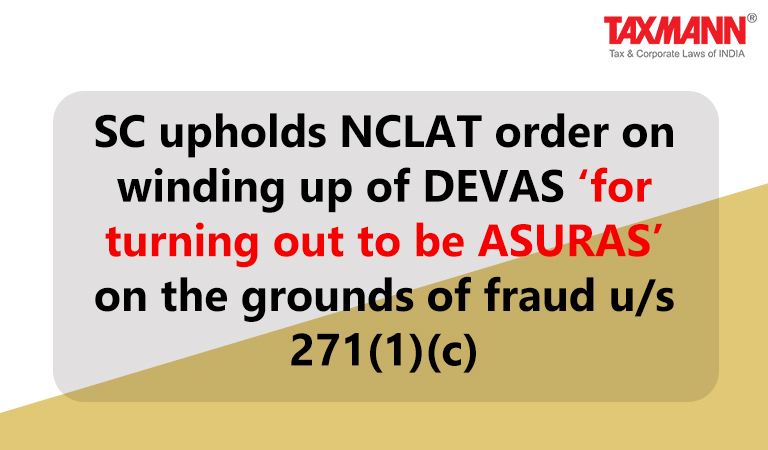SC upholds NCLAT order on winding up of DEVAS ‘for turning out to be ASURAS’ on the grounds of fraud u/s 271(1)(c)
- Blog|News|Company Law|
- 3 Min Read
- By Taxmann
- |
- Last Updated on 20 January, 2022

Case Details: Devas Multimedia (P.) Ltd.v. Antrix Corporation Ltd. - [2022] 134 taxmann.com 168 (SC)
Judiciary and Counsel Details
-
- Hemant Gupta and V. Ramasubramanian, JJ.
Facts of the Case
Antrix Corporation Limited (hereinafter referred as “Antrix”), is a Company incorporated under the Companies Act, 1956 is the commercial arm of the ISRO (ISRO is a wholly-owned subsidiary of the Government of India). Antix entered into the MOU with one of the advisors for business advisory purposes and otherwise.
Advisors made a presentation proposing an Indian Joint venture “DEVAS” (Digitally Enhanced Video and Audio Services) to provide multimedia services to mobile users using the leased S-band satellite spectrum.
For the purpose of executing the Joint Venture agreement M/s Devas Multimedia Private Limited (hereinafter referred as “Devas”) was incorporated under the provisions of the Companies Act, 1956. Immediately after the incorporation of Devdas, Antrix entered in to an agreement with Devdas named as “Agreement for the lease of space segment capacity of ISRO/Antrix S-Band spacecraft by Devas”. Antrix, later on, terminated the agreement on the ground of force majeure that GOI had taken a policy decision not to provide orbital slots in S-Band for commercial activities.
Meanwhile, CBI also filed the FIR on the Devas u/s 420 read with sec 120B of IPC and sec 13 (2) of the Prevention of Corruption Act,1988. On 18/01/2021 Antrix also filed the winding-up petition u/s 271 (c) of the Companies Act, 2013 before NCLT, Bengaluru Bench. NCLT admitted the petition of Antrix and passed the order of Winding Up.
Later on, Devas and its shareholder Devas Employees Mauritius Pvt Ltd challenged the order to wind up before the Chennai bench of the NCLAT, which also dismissed the petition. Later on, the matter went to the Supreme Court for setting aside the order of NCLT/NCLAT ordering the winding up of Devas.
Grounds of Attack by Devas
Devas contended on various grounds including the following:
(a) Definition of ‘fraud’ for section 271(1)(c) purposes
(b) Auditors reported no frauds in CARO Report
(c) A statement by NCLAT in its order that “the allegations are prima facie made out” a company cannot be ordered to be wound up on the basis of prima facie findings.
(d) Petition under Section 271(c) should have been preceded, at least by a report from the Serious Fraud Investigation Office, which has now gained statutory status under Section 211 of the Companies Act, 2013.
(e) Company cannot be wound up for fraud until criminal complaint filed for the offenses punishable under Section 420 read with Section 120B IPC have been taken to logical end
Supreme Court Held
Supreme Court quashed the above grounds on the following basis.
Fraud in section 271(1)(c) has a wider meaning than that assigned to it in Contract Act or in section 447 of the Companies Act,2013 What is covered by Section 271(c) of the Companies Act, 2013 is a fraud that goes beyond what lies in the realm of contract or in the realm of the penal provisions of the Companies Act, 2013.
As far as the question of “No Fraud” reporting by the Auditor is concerned, the auditor’s report can neither be taken as gospel truth nor act as estoppel against the company. The statement in the auditor’s report is as per the information given to them or as per the information culled out to the best of their ability.
Supreme Court after analysing the judgements passed by NCLT and NCLAT observed that merely because NCLAT used an erroneous expression those findings cannot become prima facie. The detailed findings recorded by the Tribunal show that they are final and not prima facie.
The outcome of one need not depend upon the outcome of the other, as the consequences are civil under the Companies Act, 2013 and penal in the criminal proceedings. The Supreme Court dismissed the appeal filed against the order of NCLT/NCLAT orders and uphold the decision of winding up of the company.
Disclaimer: The content/information published on the website is only for general information of the user and shall not be construed as legal advice. While the Taxmann has exercised reasonable efforts to ensure the veracity of information/content published, Taxmann shall be under no liability in any manner whatsoever for incorrect information, if any.

Taxmann Publications has a dedicated in-house Research & Editorial Team. This team consists of a team of Chartered Accountants, Company Secretaries, and Lawyers. This team works under the guidance and supervision of editor-in-chief Mr Rakesh Bhargava.
The Research and Editorial Team is responsible for developing reliable and accurate content for the readers. The team follows the six-sigma approach to achieve the benchmark of zero error in its publications and research platforms. The team ensures that the following publication guidelines are thoroughly followed while developing the content:
- The statutory material is obtained only from the authorized and reliable sources
- All the latest developments in the judicial and legislative fields are covered
- Prepare the analytical write-ups on current, controversial, and important issues to help the readers to understand the concept and its implications
- Every content published by Taxmann is complete, accurate and lucid
- All evidence-based statements are supported with proper reference to Section, Circular No., Notification No. or citations
- The golden rules of grammar, style and consistency are thoroughly followed
- Font and size that’s easy to read and remain consistent across all imprint and digital publications are applied



 CA | CS | CMA
CA | CS | CMA
